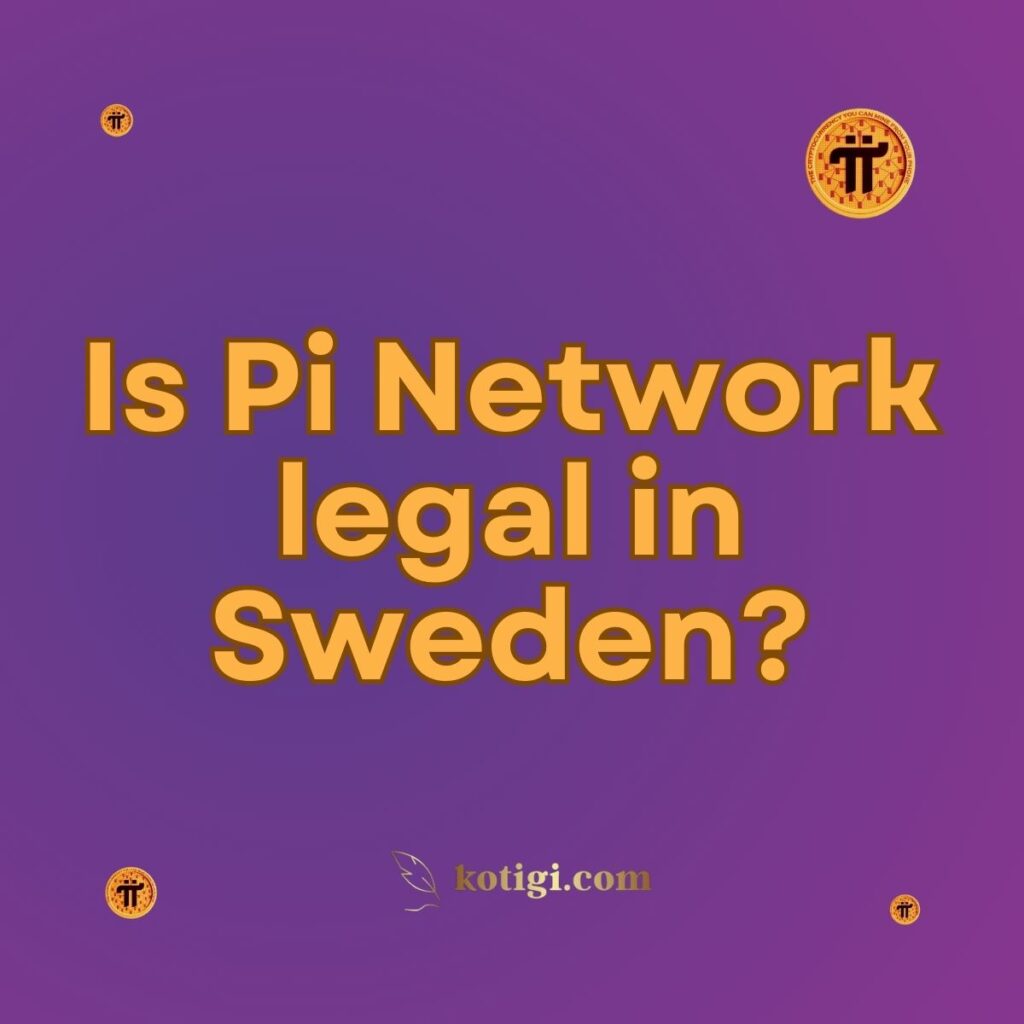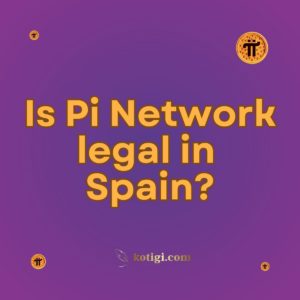
Is Pi Network legal in Sweden?
Yes, Pi Network is legal in Sweden. The country’s regulatory framework allows the use of cryptocurrencies, including Pi Network, provided users comply with national regulations such as taxation and anti-money laundering (AML) laws.
Introduction
Sweden is known for its progressive stance on technology and innovation, making it a hub for fintech advancements, including cryptocurrencies. As Pi Network continues to gain popularity worldwide, many Swedish users are curious about the legal standing of this emerging cryptocurrency within their country.
In this article, we explore the legality of Pi Network in Sweden. We’ll discuss the current cryptocurrency regulations, legal considerations for users, and how Pi Network fits into Sweden’s broader approach to digital currencies and blockchain technologies. Understanding the legal landscape ensures that Pi users in Sweden can participate confidently and legally in this growing network.
Cryptocurrency Regulations in Sweden
Sweden’s General Cryptocurrency Policy
Sweden has adopted a progressive stance on cryptocurrencies, including Pi Network. Cryptocurrencies are legal in Sweden, though they are not classified as legal tender. Instead, they are considered assets and are treated similarly to other financial instruments, meaning that they can be used for transactions, investments, and other purposes under Swedish law.
The Swedish Financial Supervisory Authority (Finansinspektionen) oversees cryptocurrency activities, ensuring that these digital assets are used in compliance with Swedish financial regulations. Pi Network, being a decentralized cryptocurrency, is legal for use in Sweden as long as participants follow the country’s relevant regulations.
No Specific Ban on Pi Network
Unlike some countries that have placed restrictions on cryptocurrencies or their use, Sweden has not enacted any specific bans on Pi Network or other decentralized platforms. Pi Network users in Sweden are free to mine and interact with the platform, but they must do so in line with the financial guidelines outlined by Swedish authorities.
Anti-Money Laundering (AML) and KYC Compliance
AML Laws in Sweden
Sweden has stringent anti-money laundering (AML) regulations, which apply to cryptocurrency activities, including those carried out on Pi Network. These laws aim to prevent the misuse of financial systems for illegal activities such as money laundering, terrorism financing, and other criminal enterprises.
In Sweden, Pi Network users are expected to comply with AML regulations by verifying their identity through the Know Your Customer (KYC) process, which is a standard procedure to ensure that only legitimate participants are involved in the network.
The Role of KYC in Pi Network
Pi Network’s KYC process aligns with Sweden’s AML requirements, ensuring that all participants are verified before accessing the full features of the platform. The KYC process is essential for ensuring the legality of user participation and helps mitigate risks related to fraud and financial crime.
For Swedish Pi Network users, completing the KYC process is not only a platform requirement but also a legal necessity to ensure compliance with national AML laws.
Taxation of Cryptocurrencies in Sweden
How Cryptocurrency Gains Are Taxed in Sweden
In Sweden, profits from cryptocurrency activities, including those on Pi Network, are taxable. The Swedish Tax Agency (Skatteverket) considers cryptocurrencies as assets, and any profits generated from their sale, exchange, or mining are subject to capital gains tax.
While Pi Network is currently in its pre-mainnet phase and its tokens do not yet have tradable value, Swedish users should be aware that when Pi tokens become tradable, any profits made will be subject to taxation. It’s essential for Pi Network users to keep accurate records of their activities for future tax purposes.
Reporting Cryptocurrency Income
Swedish tax authorities expect all individuals to report their cryptocurrency income. If users mine or trade Pi tokens for a profit once the mainnet is launched, they will need to declare these earnings in their tax returns. Failure to comply with tax obligations could result in fines or other penalties, so it is important for Swedish Pi Network users to stay informed about their tax responsibilities.
Legal Considerations for Pi Network Users in Sweden
Financial Risks Associated with Pi Network
As with all cryptocurrencies, participating in Pi Network involves some level of financial risk. The value of Pi tokens may fluctuate when they become tradable, and users could potentially face losses if the market value declines.
Pi Network is still in its early stages, and while it offers exciting prospects, there are uncertainties regarding its long-term viability. Swedish users should approach the platform with caution and ensure that they understand the risks before investing significant time or resources.
Sweden’s Support for Blockchain Technology
Sweden is known for its support of blockchain technology and has been exploring ways to integrate this innovation into various sectors. The Swedish government and financial institutions are examining how blockchain can be used to improve transparency, security, and efficiency in financial transactions.
Pi Network, built on blockchain technology, fits well into Sweden’s forward-thinking approach to digital assets. By participating in Pi Network, Swedish users are engaging with an innovative technology that aligns with the country’s ambitions to remain at the forefront of technological advancement.
Regulatory Environment for Blockchain in Sweden
Support for Cryptocurrency and Blockchain Innovation
Sweden is one of the most cryptocurrency-friendly countries in Europe, with a strong focus on fostering innovation within the fintech space. Blockchain technology has gained significant traction, and many Swedish companies are exploring its potential to revolutionize industries such as finance, logistics, and supply chain management.
For Swedish Pi Network users, this supportive regulatory environment is a positive factor, allowing them to explore Pi Network’s potential within a secure and legally compliant framework. The Swedish government’s openness to blockchain suggests that Pi Network users will continue to enjoy legal protection and access to the platform.
Potential for Regulatory Changes
Although Sweden has a clear regulatory framework for cryptocurrencies, it’s essential for Pi Network users to stay informed about potential regulatory changes. As cryptocurrencies evolve, so too will the laws that govern them. Swedish users should be aware that future laws could impact the way Pi Network operates, especially when it comes to taxation or financial reporting.
By staying updated on legal developments, Pi Network participants can ensure that they remain compliant with any new regulations that may arise.
Conclusion
Pi Network is legal in Sweden, and there are no specific restrictions on its use. Swedish users are allowed to mine and interact with the platform, provided they comply with the country’s existing financial regulations, including anti-money laundering (AML) laws and tax obligations.
As Pi Network evolves and its tokens become tradable, Swedish users will need to be mindful of their tax responsibilities and ensure that their cryptocurrency activities are reported to the authorities. The supportive regulatory environment in Sweden, combined with the country’s openness to blockchain innovation, makes it an ideal place for Pi Network to thrive.
However, as with all cryptocurrencies, it’s essential for users to exercise caution and stay informed about potential regulatory changes that could affect their participation in Pi Network. By understanding the legal landscape and following national laws, Pi Network users in Sweden can confidently engage with this innovative platform.
Key Takeaways
- Legal Status: Pi Network is legal in Sweden, and there are no specific bans on its use.
- AML and KYC Compliance: Users must comply with Sweden’s anti-money laundering laws and complete Pi Network’s KYC process.
- Taxation of Cryptocurrencies: Profits from Pi Network will be subject to taxation, and users must report their earnings to Swedish tax authorities.
- Financial Risks: Pi Network users should be aware of the financial risks associated with cryptocurrency market fluctuations.
- Blockchain Innovation: Sweden is supportive of blockchain technology, creating a favorable environment for Pi Network.
- Potential for Regulatory Changes: Users should stay informed about future legal changes that could impact the use of Pi Network.





